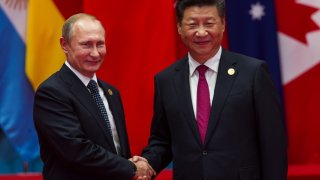BRICS+ Doesn’t Have to Be the “Rest Against the West”
With the multilateral system in shambles and geopolitical tensions rising, the United States should think seriously about how to deal with today’s multipolar world.
As leaders of the BRICS+ group of emerging economies met in Kazan, Russia, last month, U.S. Secretary of State Antony Blinken was in the Middle East for the eleventh time since October 7, 2023. The symbolism is stark. While the U.S. is mired in another Middle East war—one that is diminishing its credibility and global leadership—China and Russia are in the early stages of building alternatives to U.S.-led global financial and security architectures. BRICS+ has the wind at its back in today’s emerging multipolar world—the group welcomed Egypt, Ethiopia, Iran, and the UAE at the beginning of 2024, added thirteen new partner countries at the Kazan summit. Dozens of other countries have also expressed interest in joining.
With competition between the United States, China, and Russia intensifying, Washington should take stock of what’s driving countries to BRICS+, which Beijing and Moscow wish to position as an anti-Western grouping. The good news for Washington is that other BRICS+ countries and applicants don’t necessarily see it that way yet. Brazil and India, two founding countries, see BRICS+ as a vehicle to democratize the existing international order and usher in changes within the system to make it more capable of addressing today’s global challenges. They don’t see it as part of a “rest against the West” strategy. Indeed, many Global South countries privilege their ties with Washington but also want to join BRICS+. However, all of this could change if Washington does not take global multipolarity seriously.
Global South countries see the U.S.-led “rules-based” order ripping apart at the seams, highlighted most conspicuously by Washington’s incongruous positions on the wars in Ukraine and Gaza. For these countries, the U.S.-led order is a rigged game, with international laws and norms enforced by how they suit the interests of the West.
Another major issue for BRICS+ and Global South countries is Washington’s dominance of the global financial architecture and its widespread use of sanctions. Russia set an agenda for this year’s summit that heavily focused on sidestepping the power of the U.S. dollar, insulating itself and other countries from Western sanctions, and building alternative financial structures. “It’s not us who refuse to use the dollar,” Putin said at the summit. “But if they don’t let us work, what can we do? We are forced to search for alternatives.”
Nearly one in four countries, accounting for almost 30 percent of global GDP, are under U.S. sanctions. A Washington Post report this year detailed how U.S. sanctions have unleashed “economic warfare across the globe.” Certainly, countries like Russia should face consequences for their violations of international law. The problem is that these sanctions are often counterproductive. Sanctions on Venezuela, for example, have led to increased migration and more Venezuelans trying to get into the United States. It’s also pushed countries like China, Russia, Iran, Venezuela, and North Korea to create what The Wall Street Journal deemed a “global shadow economy” to evade these sanctions in ways that could increasingly undermine the U.S. dollar.
The joint declaration from the summit should be a cause for concern for U.S. policymakers. It called for global financial reform, creating a new BRICS+ investment platform and exploring alternatives to Western cross-border payment systems like SWIFT. BRICS+ has already made significant strides in reducing the use of the dollar for intra-group trade. China has led this charge, as its renminbi has overtaken the U.S. dollar in China-Russia trade. Beijing is also negotiating to increase the use of the yuan to settle oil transactions with major producers. China is also selling off U.S. dollar assets and buying record levels of gold.
De-dollarization may have a long way to go. However, given the profound implications for U.S. interests, U.S. policymakers should pay close attention. The dollar’s preeminent role as a reserve currency and in global commodity trade presents the United States and its citizens with “exorbitant privileges.” Not only does it give the U.S. tremendous influence and leverage in international relations, but also it means Americans have lower borrowing costs, access to cheap imports, and, overall, a higher standard of living.
BRICS+ critics often reasonably point out that the group has not accomplished much. But that doesn’t mean the group isn’t increasingly important, even if merely at a symbolic level for now. Washington can work with partner countries in BRICS+ to stymie the rising anti-U.S. sentiment that China and Russia want to foment. Washington should consider what is leading so many capitals to look for alternatives to U.S. leadership and, critically, the U.S. dollar and seek to address their concerns when they have a common cause.
It’s time for Washington to recognize that the post-Cold War unipolar moment is over and that today’s global challenges—from climate change to pandemics to regulating artificial intelligence—require international, not just Western, cooperation. With the multilateral system in shambles and geopolitical tensions rising, the United States should think seriously about how to deal with today’s multipolar world. U.S. leaders can start with what isn’t working—the ever-expanding pursuit of primacy, a reflexive reliance on sanctions, and the double standards it employs on international laws and norms—and use that as a roadmap to refashion its approach to international affairs. It’s what is best for the world – and it’s what is best for Americans.
Adam Gallagher is a contributing fellow at Defense Priorities. For more of his writing and analysis, follow him on X: @AEGallagher10.
Image: Shutterstock.com.

